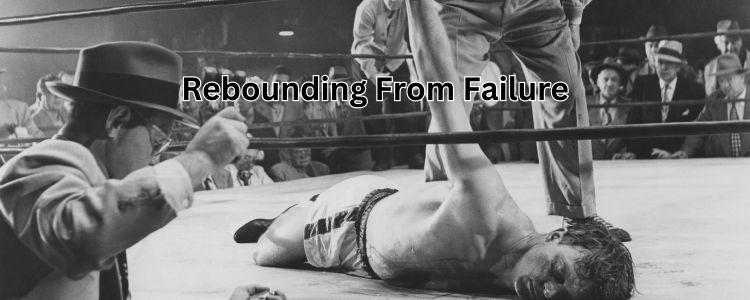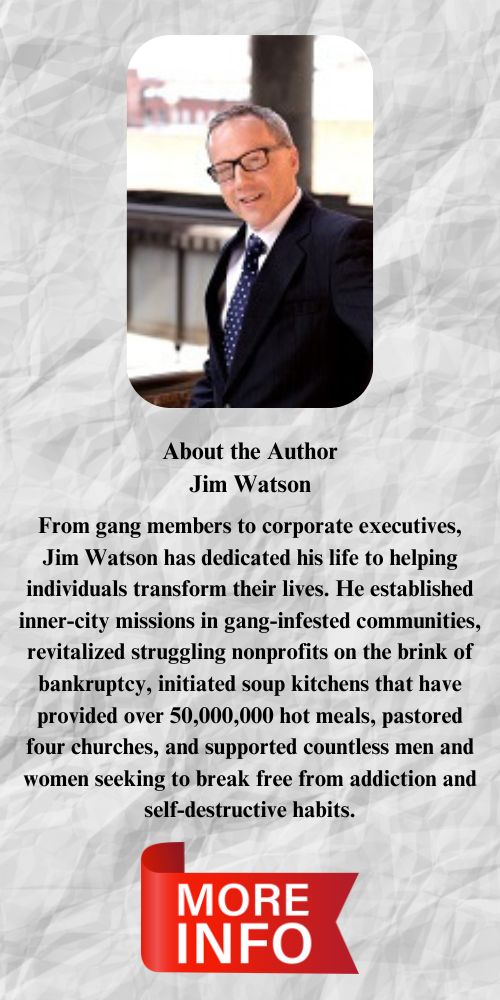
Rebounding From Failure

Rebounding From Failure
You feel like someone sucker-punched you in the gut. Maybe you didn’t see it coming. Perhaps you did but felt helpless to do anything about it. You can almost taste the dirt in your mouth from falling flat on your face. Maybe it was even your fault. At this point, it doesn’t matter. You’re down for the ten-count, confused, angry, without a plan to get back on your feet and turn your situation around.
Encouragement from loved ones and friends sounds hollow, almost like the clatter of adults in the life of Charlie Brown. Wah, wah, wah, wah, wah. It doesn’t resonate; it can’t puncture the web of pain that holds you captive. You feel humiliated, as though your setback is a moral indictment of your character, proof that you are unfit for happiness or success. You just don’t have what it takes.
Sometimes, It Feels Like God Has Abandoned You
Even worse, it feels as though God has abandoned you, deserted you in your hour of need, and left you to struggle and fend for yourself. Failure becomes God’s message of rejection, a pronouncement of your unworthiness to serve him, a repudiation of your faith in his goodness and love for you. God’s silence during your fall from grace exasperates your pain, causing a belief crisis that threatens your life’s underpinnings.
You Don’t Need Another Motivational Speech
Suppose this describes you, your situation, your emotions, and your sense of rejection and failure. In that case, the last thing I want to do is talk down to you, to pile on you with clichés that make you feel even more hopeless about ever rebounding from your situation. You don’t need another motivational speech that tells you to get back on your feet, learn from your failure, fail your way to success, and claw your way to your destiny. Right now, such speech is more like an accusation than an encouragement. Its hidden message rebukes you for deserting the battle before it ends, labeling you a quitter who didn’t try hard enough. Blame is not a plan.
When someone tells you to get back on your feet and rejoin the game, what exactly does that mean? If you knew what to do, you would do it. But you don’t. Getting back on your feet assumes you have a plan for getting there. When you reach the point of ultimate despondency, you no longer see any escape routes; your options are beyond reach, restricted by waves of depression and gloom. You can only comply with their advice if you know how to fight on and rejoin the game. You don’t see a way out of your hole. You’re stuck.
Failure is Not the Final Word About Your Life
Despite your predicament, if you believe that failure is the final word concerning your life and character, it will be. You must move beyond the message of failure by making a decision to live, not to spend the rest of your life ruined by an episode that you can no longer fix. When a person is drowning, they can choose to surrender to their circumstance and die or fight with everything within them to get a breath of air and live. Deciding to live a life beyond failure is the first step in regaining your direction and formulating a plan to regain your life.
Choosing to live and not flounder in defeat does not mean you have a plan for success. It is only the first step. Your decision to live and not die means you are now open to other possibilities besides ongoing ruination. Instead of acquiescing to a permanent state of failure, you are ready to search for a way out of the hell that your life has become. It is not a battle plan. It is a breath of fresh air unobstructed by the dirt of failure. It is the beginning of the beginning.
I know what it feels like to fail, to be filled with self-loathing, overwhelmed by shame, and crippled by embarrassment and regret. Like you, I felt ruined and tainted, unworthy and incapable of success. But then I decided to live, not to allow setbacks and failures to define me as a person. I chose to live, reinvent myself, and move beyond my helplessness and defeat. I didn’t have a plan, but I knew a plan to turn my life around was waiting to be discovered by me. I just had to breathe.
Do you want to live? Only you can make that choice. No one else can do it for you. What will you decide? Your future is waiting.
Try To See Your Life From God’s Perspective
Perspective is a marvelous tool for understanding reality and preventing you from succumbing to the destructive forces brought about by an emotional reaction to failure. It enables you to get a grip on yourself and understand the deeper meaning of your situation and its ramifications for your future, both good and bad. Perspective helps you to see the bigger picture of your life within the context of how events and actions connect as stepping stones for reaching your ultimate destiny.
The Apostle Paul wrote in Philippians 1:12-13 (KJV):
But I would ye should understand, brethren, that the things which happened unto me have fallen out rather unto the furtherance of the gospel; So that my bonds in Christ are manifest in all the palace, and in all other places;
When Paul wrote his letter to the church at Philippi, he was in prison, on trial for his life for preaching the gospel. For most people, imprisonment is not a reward for a life well-lived; instead, it is considered punishment for wrongdoing, a sign of failure, and a stain on a person’s reputation. Prison places limitations on a person’s future.
Paul’s enemies rejoiced at his imprisonment, seeing it as a failure of his life mission and a denial of God’s call on his life. They saw it as a victory for their anti-Christian agenda, proof that their view of Jesus was superior to Paul’s testimony of his encounter with Jesus on the road to Damascus. Prison meant Paul lost, and they won.
Failure Can Cause You To Question God’s Plan For Your Life
Perhaps failure and setbacks have caused you to question some basic assumptions about God and your relationship with him. You thought since God was on your side, you could not fail, that a relationship with him assured you of victory and success at whatever you attempted to do. You believed that as long as you followed Christ, you could not fail. Now, your whole theology is in disarray, and you might even be questioning the existence of God, or at least his love for you.
Your well-meaning friends try to comfort you by explaining your abandonment by God as a consequence of sin in your life or a lack of faith. Their theology cannot entertain the idea that reward and conduct are not necessarily intricately linked, bound together by absolute laws that reject the notion of failure in the life of someone intimately and personally connected to God. Failure means sin.
The Apostle Paul Saw Setbacks As Part Of God’s Plan For His Life
But that’s not how Paul saw his situation. He saw his imprisonment as part of God’s call for his life. The dark and dreary prison cell, the rats and vermin, were the tools God used to proclaim Christ to men and women who would never have heard of Paul if it were not for his prison experience. His imprisonment did not frustrate or prevent God from using his confinement to help him fulfill the mission he had assigned for Paul’s life- the gospel proclamation to unbelievers.
Paul had perspective. Because of his faith in God, he could see the drama of God’s activity in his life, regardless of his circumstances or sense of personal helplessness about his future. His prison setback was God’s opportunity to use Paul to reach the imperial palace of the Roman Empire with the message of Christ.
Paul’s perspective is a valuable lesson for your life. Despite your present circumstance, setback, or failure, you can rest assured that God has not given up on you, abandoned you to an inconsequential life, or closed his eyes to your hurt and pain. He is still deeply involved in your life, using all the debris and wreckage to accomplish his purpose for you.
Reversals And Failures Can Take Your Relationship With God To A Higher Level
Reversals and failure are not always the result of sin. For some of you, your current predicament is something God is using to deepen and elevate your relationship with him. It is a necessary step for greater intimacy and focus, a forming of the image of Christ in your life. Without that image, you will never reach your full potential, reducing your future to a shadow of what could have been. In one sense, your failure is an expression of God’s love for you, a testimony of his desire that you live a life that matters–a life filled with impact and significance.
Although God’s love for you is personal, his mission for your life is more significant than you. God assigned Paul a calling beyond his reach, a task too fantastic and challenging for a Pharisee or tentmaker. On the surface, it was laughable even to imagine Paul would ever be able to proclaim the gospel to the whole imperial palace. And yet it happened. God used his imprisonment to transform the improbable into reality and substantially alter the future of Western Civilization. Paul’s misfortunate was the instrument employed by God to reach the unreachable with the gospel.
God is also using your failure to do something bigger in the world than your individual transformation. It isn’t always just about you. His use of your situation to have a more significant and lasting impact on the world brings meaning to your suffering. Your failure may be one of your life’s most constructive occurrences. It may become the tool by which you reach your destiny.
Own Your Failure And Give It To God
But maybe what happened to you is your fault. You are to blame for your failure. You are not a victim of circumstance or the wrongdoing of others. You made some bad decisions. You got caught up in yourself and your infallibility and refused to listen to the counsel of others. You succumbed to your pride and wrecked your life. And now you feel cast aside, as though your life is beyond repair, permanently tarnished, and consigned to the backburner of usefulness.
You have reached a critical juncture, a moment of decision. What you decide will shape your immediate future and possibly the rest of your life. You can continue to believe the decisions and acts that led to your failure are the final definitions of who you are as a person, that your sin or imprudent decisions cast an enduring shadow on your character and relationship with God, and that God’s forgiveness will never lead to restoration and usefulness. In other words, you can allow an event to destroy your potential and sideline you for the rest of your life.
Instead of settling for a life of uselessness and self-pity, believe that God’s message of forgiveness is also for you. Remember the words of the Apostle John in I John 1:9 (KJV):
If we confess our sins, he is faithful and just to forgive us our sins, and to cleanse us from all unrighteousness.
When you confess your sin, God restores and makes you whole again. The Bible overflows with stories of men and women who betrayed God’s trust in them and were still used to do enormous and mighty deeds that defied the odds and impacted the world. Their confession of wrongdoing was the starting point for a new life. When confronted with the enormity of their sin, they refused to remain stuck in self-destruction and failure. They embraced God’s forgiveness. In doing so, they met their destinies.
Previously, I encouraged you to make a decision to live, to not wallow for the rest of your life in the muck of your failure. Now I invite you to trust God, surrender your life to Christ, and believe he is working to advance your life and use you for the greater good of his kingdom. To do so is to bring hope back into your life. When you have hope, you are no longer held captive by your past failures and decisions. You have a fresh start, a new beginning, another chance to be used by God and reestablish your life.
Without surrender, you never truly get your life back. Even in success, your life is a shadow of what could have been. What will you decide? God is waiting.
There Are No Shortcuts To Reversing The Consequences Of Failure
When failure buries your face in the dirt, choking out all your hopes and dreams, you will be tempted to fix the situation by the sheer force of your personality. You may succumb to motivational speeches and sermons that rarely work in real life, leaving most people filled with even more doubt than their initial failure. Christian and secular cliches are the exception and not the rule. For most people, willpower has been tried and found wanting. It usually leads to more significant personal destruction and disappointment.
Mental toughness does have a place in life. It enables you to resist surrender to life’s daily challenges and stay the course when tempted to quit. It also serves as a buffer against criticism and accusations, which often accompany failure and setbacks.
But mental toughness will not save you from yourself or deliver you from the consequences of your actions. Although God uses many ways to transform you into a man or woman who reflects the character and personality of Christ in your daily life, his primary method is the Word of God, the Bible. Begin your new journey today by opening your Bible and reading it. It can still change your life.




